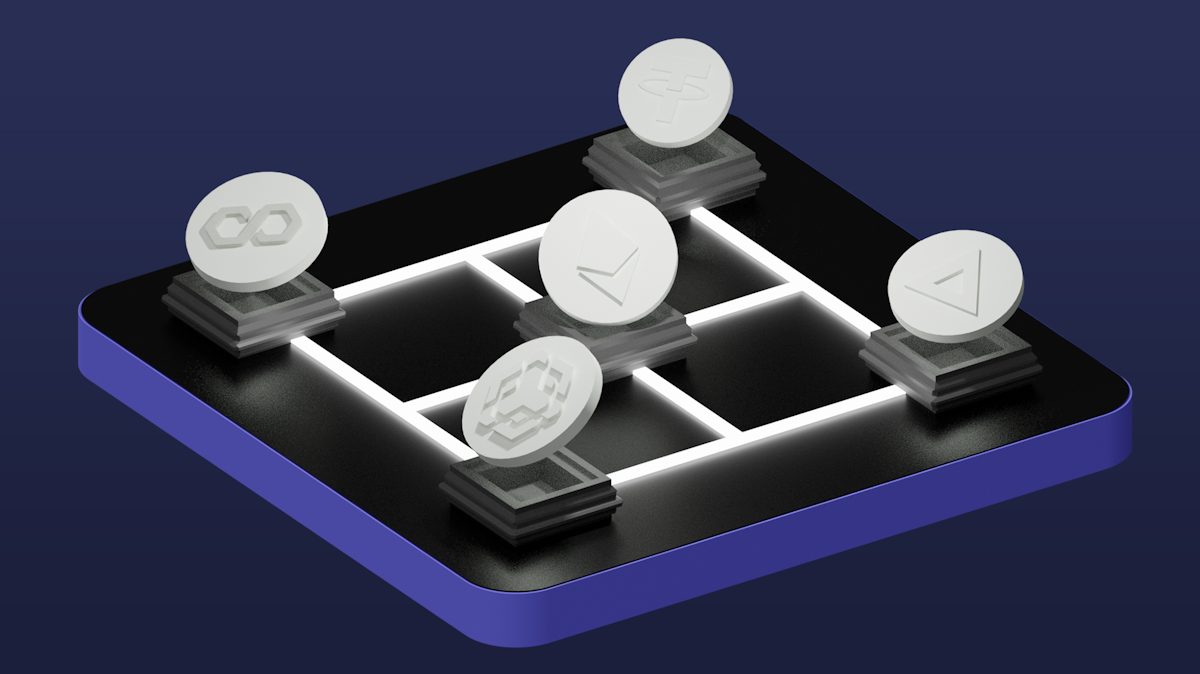What is cryptocurrency?
Cryptocurrency is digital money that uses cryptography for encryption when transmitting crypto. So you could call it encrypted money. We've all heard about cryptocurrencies, but actually many people don't know exactly what it means. That's why we wrote the following lesson. After reading this, you will know exactly what a cryptocurrency is and what important features it has.
Brief summary
✔️ Cryptocurrency is a form of digital money in which cryptography is used to encrypt information to be sent.
✔️ Cryptocurrencies are kept in a ledger called the blockchain.
✔️ Bitcoin was the first cryptocurrency, created in 2009 by Satoshi Nakamoto.
✔️ Pros and cons of cryptocurrencies.
Definition of cryptocurrency
Cryptocurrency (or also crypto currency or crypto) is a compound word. You will be familiar with the currency part, which means currency or also money. The abbreviation crypto comes from cryptography.
Cryptocurrency involves the use of cryptography. This involves encrypting or hiding information to be sent in such a way that someone who wants to "eavesdrop" on the message cannot do so against acceptable effort.
Cryptography is used to transfer data that outsiders should not see. The recipient must have the key to decipher the message.
Technique of cryptocurrency
Cryptocurrency generally uses asymmetric cryptography, where the public key is known but the secret key need not be exchanged.
Buy Cryptos
If you start trading cryptocurrencies you will encounter the terms public and private key encounter. Your public key here refers to your cryptocurrency address that everyone is allowed to know and to which people can send coins. For example, it is an address on an exchange.
Private key is kept hidden because it gives access to your funds. Only the owner of the coins is allowed to know it.
Shareability of most crypto currencies
You could also think of cryptocurrency differently. If you translate the term literally you could speak of "small money." Crypto as small and currency as money. The beauty of cryptocurrency is that you can break it down into very small pieces.
Thus, 100,000,000 satoshis (after the creator of Bitcoin) add up to 1 Bitcoin. All cryptocurrencies can be divided into smaller denominations. A very big advantage of this is that when the value of a cryptocurrency skyrockets, like Bitcoin, you don't have to put down large amounts of money, you just buy a small amount in satoshis.
Blockchain technology
A cryptocurrency is kept in a ledger that the blockchain called. Each transaction is processed by a network of computers, so that at any given time all these computers know exactly what addresses coins have and how many. These computers are called validators or nodes called and they occur on every blockchain network.
Blockchain transactions
When a transaction is made, these validators will put this transaction in the ledger and distribute this transaction to the other validators, so they all have the same state of the network.
As a result, problems such as double spending prevent, because a transaction only goes through if more than 51% of the validators approve the transaction.
Blockchain ledger
With a blockchain, think of blocks that form a chain. In each block is information about the state of the network being maintained, the digital ledger.
This includes transactions and new coins. This is immutable and therefore very secure. As soon as a new block is created, it is added to the end of the chain, making the blockchain one block longer. A block can only be added at the end of the chain, since the previous blocks are already fixed.
Cryptocurrency is a form of digital money, where the value is created by supply and demand.
What was the first cryptocurrency?
The first cryptocurrency was Bitcoin. It was created in 2009 by Satoshi Nakamoto created, a mysterious figure or group that hid its identity. It is a virtual currency.
Bitcoin basics
Nakamoto described Bitcoin in his white paper as a "peer to peer electronic money system." He has made it a completely decentralized money system where no third party is involved, everything works automatically according to his encodings.
Satoshi was not happy with the money system as it worked, so he invented money that did not require a bank or other intermediary.
Since then, Bitcoin has remained the world's leading cryptocurrency in marketcap or market capitalization. Ethereum and other cryptocurrencies are coming down hard, but still Bitcoin is king.
Cryptocurrency development
Since then, a huge number of types of crypto currencies have been added with all kinds of features. Cryptocurrency is in fact still very young, but its capabilities are so extensive and important that they will not disappear overnight.
The technology behind them is in some cases much more effective than the unwieldy constructs that governments and large corporations have as technology. Therefore, the number of tokens will only increase.
Future cryptocurrency
Cryptocurrency and blockchain will eventually make their way into our personal lives. One example is Central Bank Digital Currency (CBDC). But many other forms will follow. With acceptance and application, the value of projects will also increase. And thus the price of the underlying cryptocurrency.
Cryptos and government
As people use more crypto currencies, the Dutch Central Bank and the European Central Bank will also start to show more interest in digital currencies. Before you know it, the Financial Markets Authority will also start getting involved and coming up with new regulations.
Whether that will benefit the crypto market only the future can tell. When compared to stocks, there is more to be gained in digital currencies for savvy investors than in traditional financial markets.
What are the 12 benefits of cryptocurrency?
Safety.
Because cryptography is used in the transmission of cryptocurrency, fraud is eliminated or extremely difficult. Double spending is virtually impossible or made very costly by the creator of Bitcoin Nakamoto and the other cryptocurrencies have that built in as well.
Speed.
Whereas with a bank transaction you often have to wait hours or even days or longer for the transaction to complete, with cryptocurrency you can usually process transactions almost instantaneously, depending on the coin's network.
Overall.
Cryptocurrency knows no borders. You can trade your cryptocurrency with anyone anywhere in the world, as long as you have a digital wallet.
Decentralized.
There is no central authority to watch over everything, like a bank. Everything happens automatically on a cryptocurrency network. This makes everything much cheaper. Anyone can also join, because you don't have to pass a BKR credit check or fill out all sorts of things before you can join. They call that permissive, you don't need permission to buy crypto.
Blockchain.
All transactions and new coins are tracked in a database maintained by thousands of computers around the world. So the cryptocurrency is never offline and no one goes on vacation. You don't have to trust a company to issue or lend your crypto, as banks can.
Anonymous.
Transactions are tracked on a blockchain, but the identity of the possessor is not revealed. Only the number of your wallet is known.
Volatility.
Because different crypto currencies go back and forth in cycles, you can make money by buying your crypto low and selling it at a higher price.
Ownership.
Crypto is completely in your possession if you have the private keys. Fiat money can be issued, but can also be influenced by the Dutch Central Bank or financial institutions in many ways, such as reprinting and causing inflation.
Cheaper.
When you deposit your money in a bank you have to pay for all kinds of things. Almost always it is cheaper to trade crypto without a bank.
Accessible.
Anyone can participate, although governments can intervene by, for example, banning trading in Monero because of the possibility of money laundering.
Irreversible.
A transaction with a cryptocurrency cannot be reversed, due to the fact that the blockchain has already been updated by thousands of computers around the world. Only new transactions can be added, but old records can never be changed. This can be very important for traders, they know that it cannot be reversed, like at a bank.
Known quantity.
Whereas fiat money can be printed at will, crypto coins cannot. Each coin indicates how many are on the market and how many will be added. Coins that do not comply will be distrusted and probably dumped.
What are the disadvantages of cryptocurrency?
Technical.
You have to do quite a bit of reading before you know enough about a coin, let alone the entire cryptocurrency market. It's all so vast and complicated that it's almost impossible to fully immerse yourself in this world.
Volatility.
Although it can be an advantage that crypto goes up and down in cycles, it can be so that your investment is evaporating and you take the safe bet and sell at a loss.
Energy consumption.
Especially networking with Proof of Work., such as Bitcoin, are in the news negatively because of the high power consumption in mining. Bitcoin's network uses as much power as all of Sweden, so there's something to that.
Transaction costs.
There are exchanges, but also cryptos that do charge high transaction fees, including Bitcoin or Ethereum. It often helps to first sell the coins within the exchange and then send them in other crypto currencies, such as XRP.
Security.
You need to know a fair amount about the technology. For example, you often have to turn on 2FA, which means you need an authenticator. Also, you have to write down login codes somewhere in a notebook and seed phrases. If you lose these things or pass them on to someone else, all your funds may be lost.
Scams.
Because many people do not know enough about cryptocurrencies, there are many ways they can be cheat.
Considerations regarding cryptos and blockchain
Of course, the advantages far outweigh the disadvantages. With cryptocurrency, the future is likely to be increasingly bright, as more and more adaptation will follow.
The disadvantages will certainly be scrutinized and reduced or resolved where possible. The advantages will be built upon and expanded.

